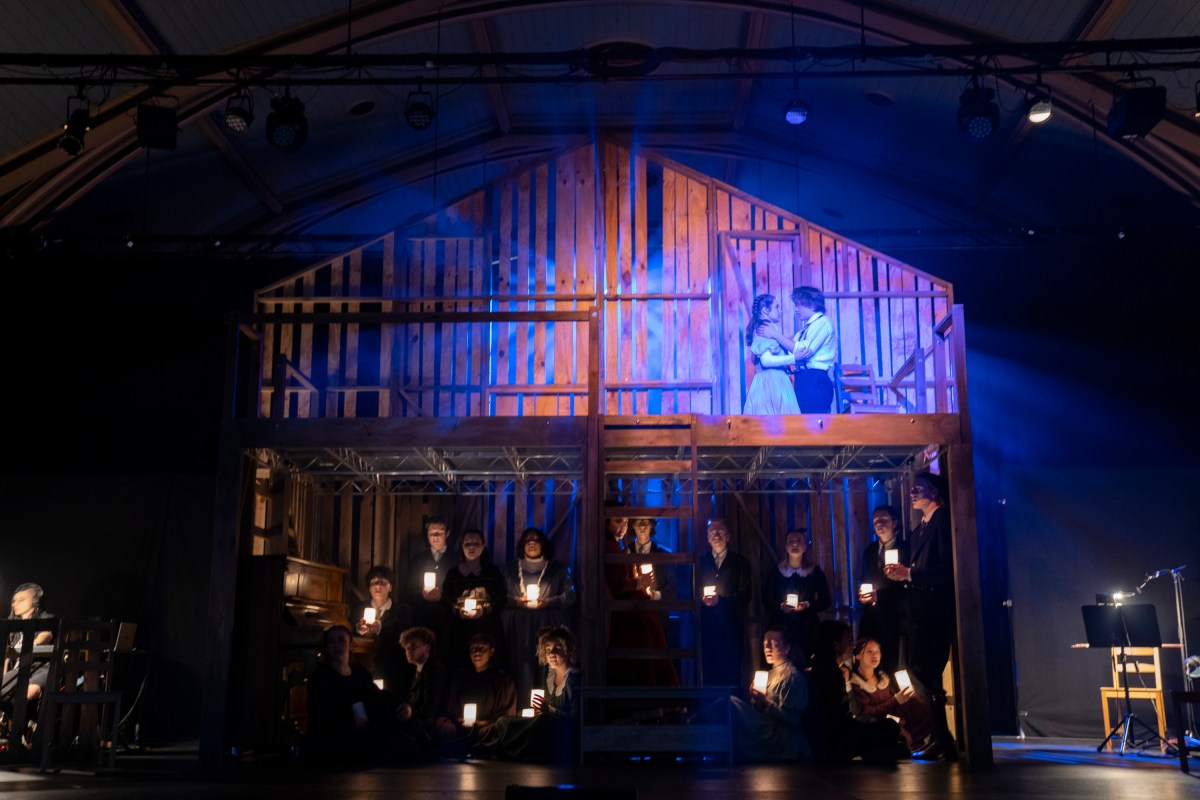Frank Wedekind’s 1891 play The Awakening of Spring, about adults quashing the desires and questions of teenagers to dreadful ends in a Lutheran society, was among the most censored works in theatre for decades. In 2006 it was superseded by a tamer adaptation, Spring Awakening, charged with beloved, incisive songs by Steven Sater and Duncan Sheik.
Still, much of the newer version’s power hinges on honest renderings of intimacy, abuse and their unsettling overlaps, demanding greater vulnerability from its performers than other musicals. It was surprising and intriguing to learn that Stage School Australia – the students of which are coming of age at an intensely heuristic time, with sexuality, consent and mental health all more topical than ever – was taking it on.
The Meat Market, vast and reverberant, was an ideal venue for a production very loyal to its source material. The spare wooden set by Claude Marcos effortlessly served as a classroom, house, hayloft and finally graveyard. As Melchior, the precocious castigator of the lies and blindspots by which he and his peers are stifled, Darcy Smith gave a remarkably dedicated performance. A different actor may have attenuated the discrepancy key to the character, but it felt truer and more damning of negligent authority to commit to Melchior being both a benign seeker of freedom and a sadist capable of coercion, unsure how to proceed with either side of himself. Aijah Glenn’s Martha was likewise convincing in her shy, resigned confession of her father’s violence – a woman and a child at once.
The production’s strong suit was its dance numbers, choreographed by Victoria Morris. Ferocious channellings of longing, frustration and melancholy, they earned the wild applause they received. The four-piece band never missed a beat, and the choral harmonies were ethereal and invigorating, matching the calibre of the original tracks available on Spotify.
Perhaps these virtues sated a significant portion of the audience, but I had looked forward to a more affecting story. Spring Awakening’s subjects and arc mean that forsaking emotions, or conveying them too mildly, can easily make things feel schematic and disjointed. Scenes sometimes felt almost as hasty as ticking a box, rather than cogent, nuanced deliverances of chemistry or its opposite. While the solos were commendably sung, a lack of movement and expression made it hard to believe that Moritz was descending into anguish, or that Wendla felt as conflicted as you’d expect about her illicit encounter with Melchior.
One could ascribe this dearth partly to the difficulty of delivering a loaded, old-but-newish work coherently. Spring Awakening may be predominantly tragic, but other iterations of the musical have leveraged its audacity and its lighter shades to invite plenty of laughs. A more resourceful approach to the text in the early stages of production likely would have amounted to a punchier dramedy, rather than the limbo I increasingly felt I was watching.
Why not pronounce that word in a way that underscores the awkwardness, I found myself wondering, or intensify that admission of yearning that sums up the dilemma of adolescence? When humour was clearly attempted, it struck me as unwisely assigned, the clownishness of the professors in Act Two undermining the notion that they would inspire much compliance in the young. Welcomed was when Amelia McConnel (Anna) and Jacob Carr (Hanschen) seized the script’s opportunities for comedy.
Perhaps the instincts of the performers should have overridden traditionalism more often. When the 23-strong troupe assembled, in their respective normal clothes, to sing the final track, ‘The Song of a Purple Summer’, I wanted to view it as a deliberate statement on the timelessness of the show’s basic themes. But I couldn’t be sure.
Read: Theatre review: Sunday, MTC
It can be unnerving to defy a work’s given parameters, but for Spring Awakening, wherein the 19th century intersects with rock music, ingenuity seems more feasible than in other shows. I would have loved to see a version of this show that felt more attuned to the present. The show is about empowering the young, after all.
Spring Awakening adapted by Duncan Sheik and Steven Sater from Frank Wedekind’s original work
Young Australian Broadway Chorus
Meat Market Melbourne
Spring Awakening was performed from 1-21 January 2023





